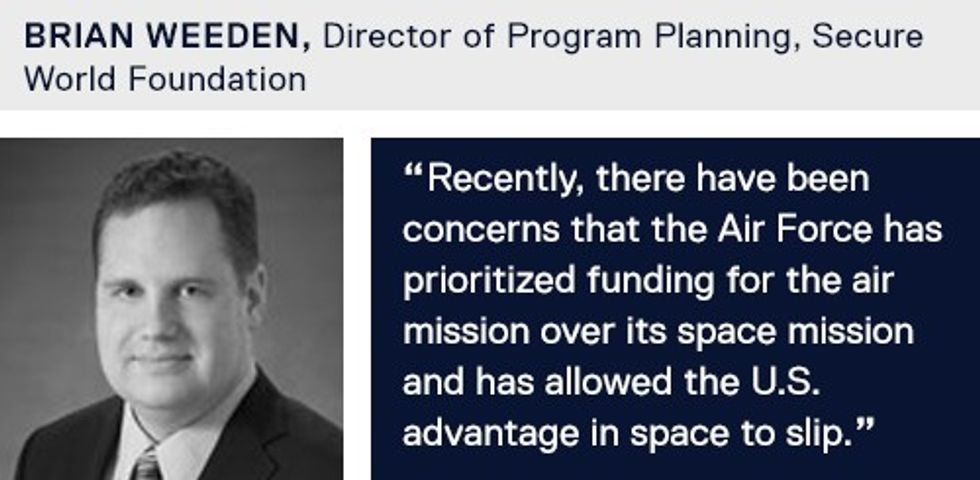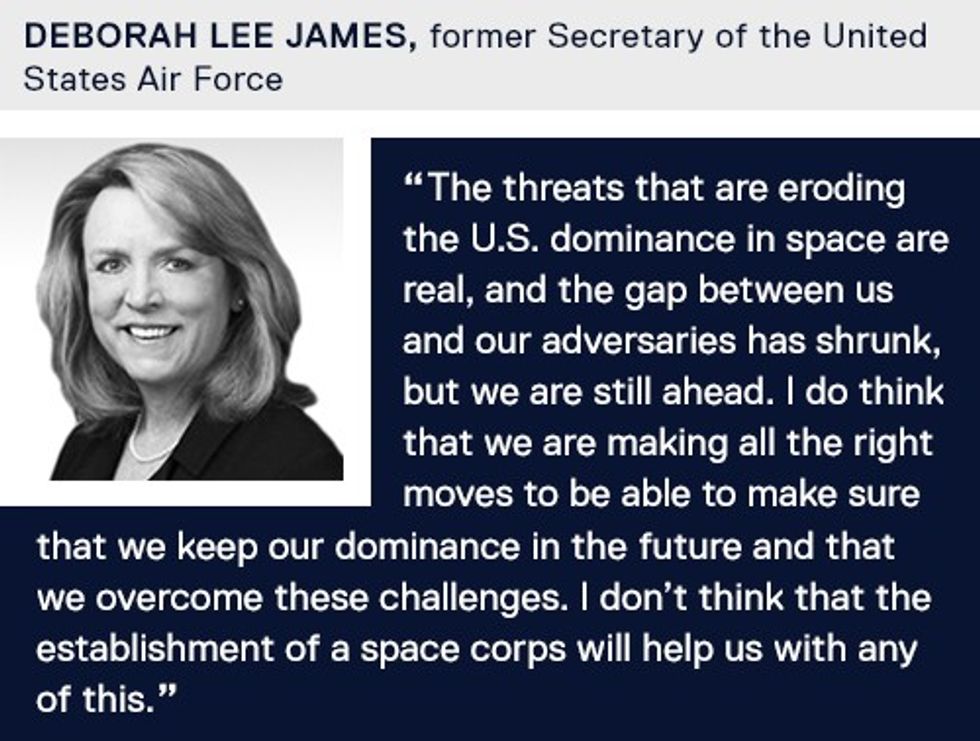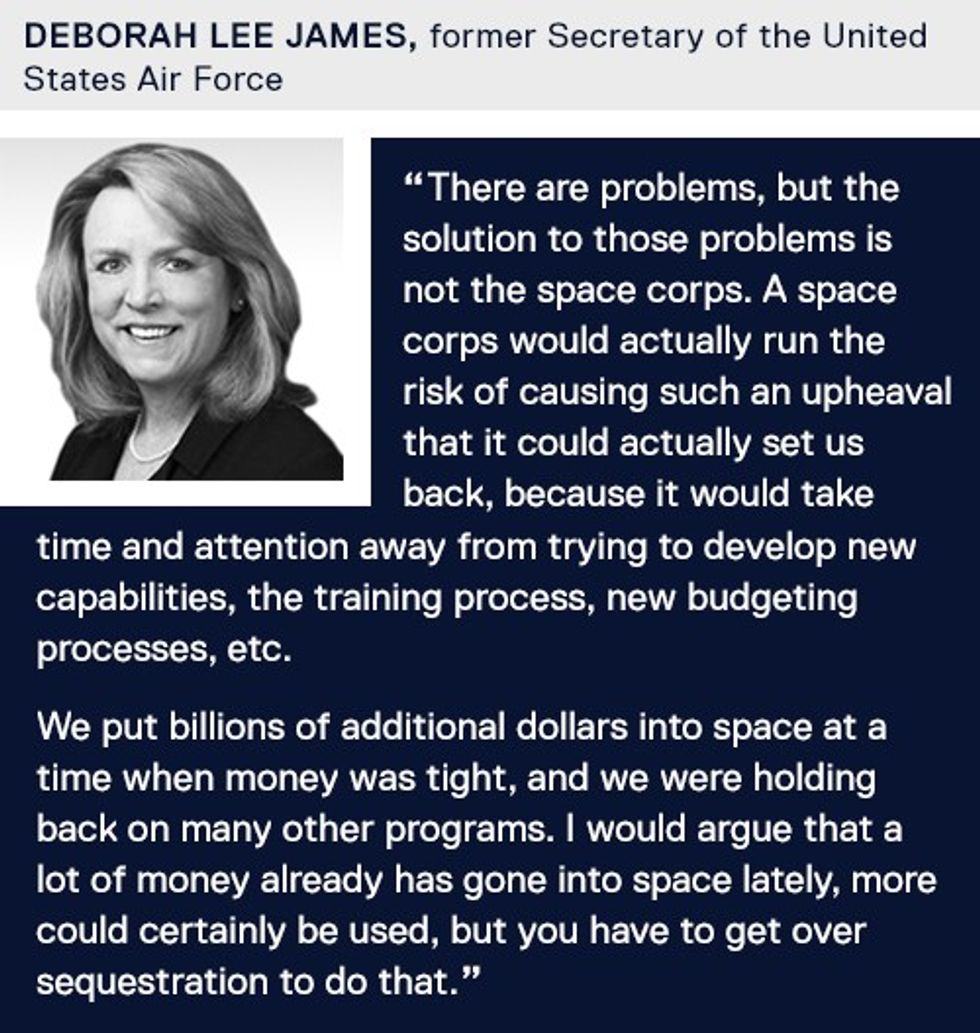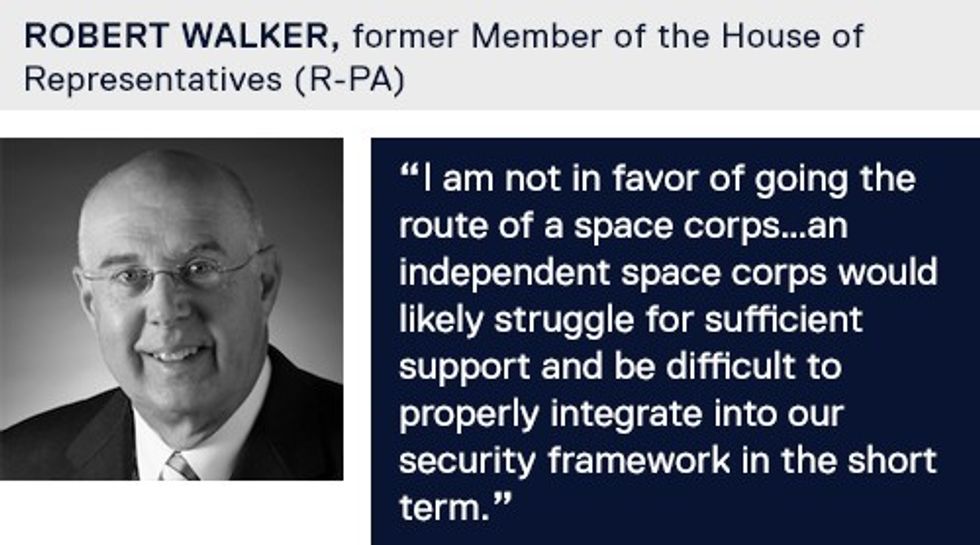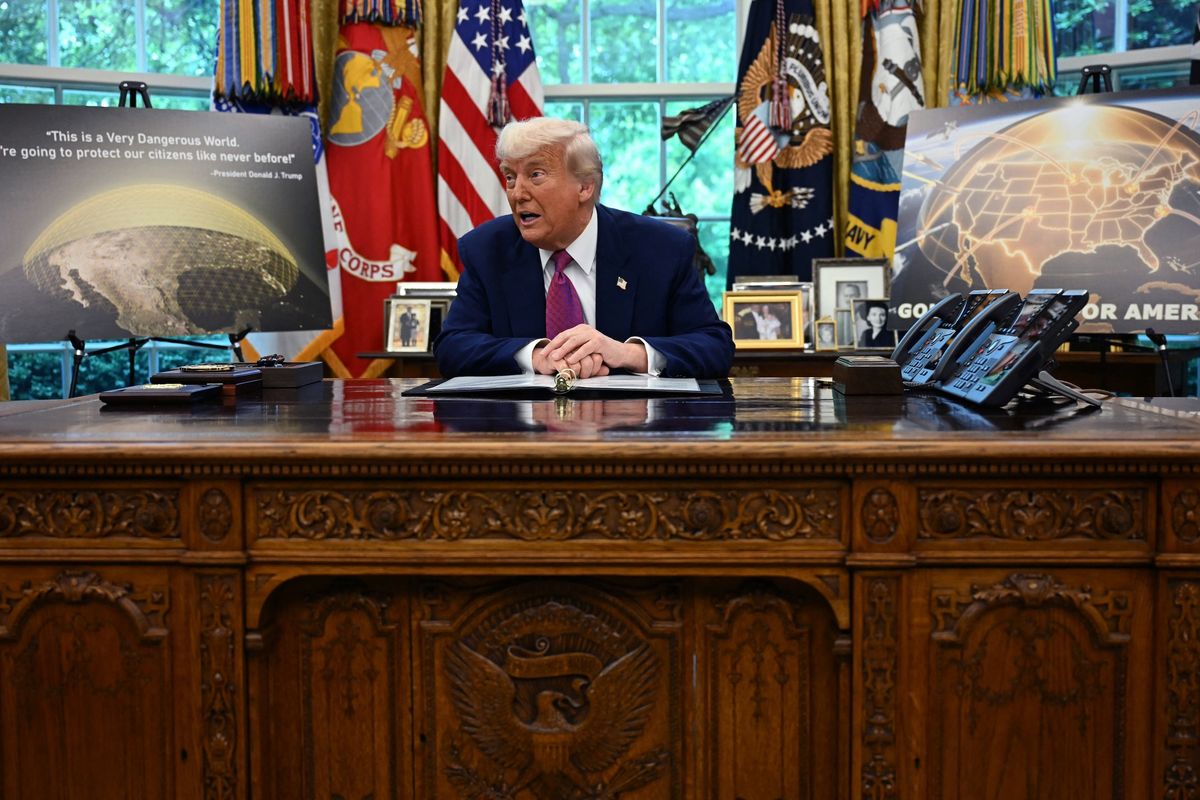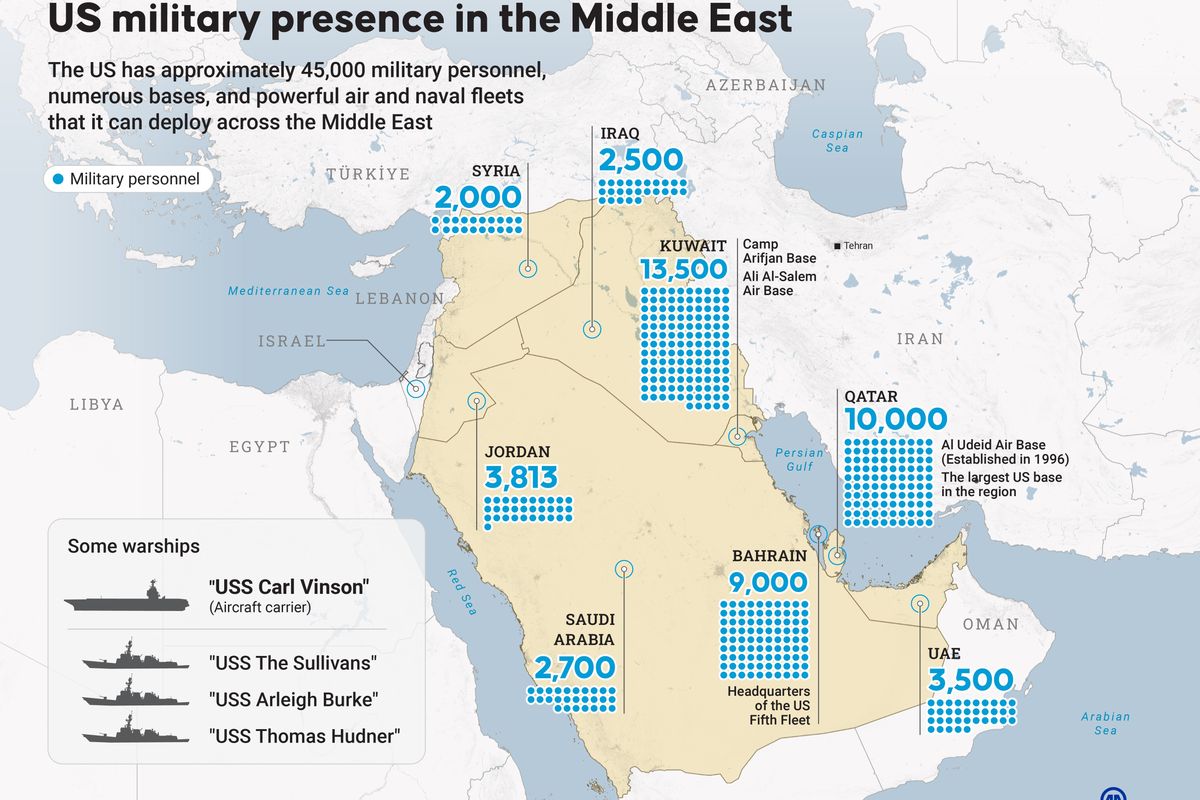President Trump on Monday called for the creation of a new Space Force to be designated as an independent, sixth branch of the U.S. military. Just a few months ago, The Cipher Brief polled our experts with deep knowledge of the issue. Former Air Force Secretary Deborah Lee James was not in favor - nor was she alone. Her view was shared by Secretary of Defense James Mattis, who was among the critics who cited a host of reasons, including inefficiencies of creating new organizational layers, increased costs and a lack of integration as reasons to keep the space capabilities under the structure of the Air Force Space Command. But supporters of the concept, including Mike D. Rogers (R-Ala.) and Jim Cooper (D-Tenn.) argue that the United States has lost its competitive advantage in space, and we need the innovation and specific focus of a dedicated space capability to get it back.
Here's a closer look at what those high-level concerns were just a few months ago:
The security of space has become significantly more contentious thanks to increased accessibility – both in terms of technology and cost – to counter-space weaponry. The creation of a “Space Corps” branch of the U.S. military, currently under consideration in Congress as part of the FY2018 National Defense Authorization Act (NDAA), would fundamentally change the way the U.S. military thinks about and operates in space. The NDAA legislation (a roughly $700 billion authorization) includes an amendment requiring the creation of a space corps by 2019; and it is a bitterly contested issue.
- Currently, the Department of the Air Force is responsible for the majority of U.S. space operations.
- The proposed space corps would operate as a separate service under the Department of the Air Force in a manner similar to the U.S. Marine Corps’ status as part of the Department of the Navy.
- Proponents argue that a space corps is necessary to prioritize expertise and resources for what may be the most hotly contested military domain of the 21st century.
- Opponents, like Secretary of Defense Jim Mattis argue against “the creation of a new military service and additional organizational layers at a time when the military is focused on reducing overhead and integrating warfighting functions.”
Both supporters and opponents of the amendment agree that the threat presented by adversaries in space is real and growing. The new space race, kicked off by tech developments and rapidly shrinking orbital rocket launch costs, has brought the idea of war in space –once only the fodder of science fiction – much closer to reality. Anti-satellite weaponry as well as cheap and easily launched micro-satellites have opened space both to emerging powers and possibly even non-state actors.
- Director of National Intelligence Daniel Coats wrote a year ago last May that “both [China and Russia] are increasingly considering attacks against satellite systems as part of their future warfare doctrine.”
- The 2011 U.S. National Security Space Strategy acknowledged that space, “a domain that no nation owns but on which all rely, is becoming increasingly congested, contested, and competitive.”
- China tested a kinetic anti-satellite weapon (ASAT) in 2007, which created over 3,000 pieces of space debris. Since then, Beijing has reportedly conducted at least eight ASAT tests, including ground-based anti-satellite rocket systems. China is also reportedly developing laser- and cyber-based ASAT systems designed to either destroy or spoof enemy satellites.
- Russia has successfully flight-tested a direct-ascent ASAT weapon – the PL-19 Nudol – three times, most recently in December 2016. Moscow is also reportedly working on airborne kinetic and laser ASAT systems.
- At least 9 nation states are space-capable, and the proliferation of private launch companies allow individuals and organizations to launch their own satellites or microsatellites for $30,000 or less.
The House NDAA FY18 bill argues that creating a new independent service for space is an urgent necessity in a world where U.S. space supremacy is no longer assured. The NDAA amendment, which passed the House Armed Services Committee with only one dissenting voice, is designed to force DoD to focus attention on a military domain the bill’s sponsors say has been lost among other threats.
- From GPS to intelligence imaging and secure communications, U.S. space assets are critical to nearly every American military operation around the globe. Disrupting American space architecture, even temporarily, would severely hinder U.S. military readiness.
- “The Air Force is as fast as a herd of turtles as far as space is concerned,” said Mike Rogers (R-AL), one of the amendment’s co-sponsors alongside Jim Cooper (D-TN), last September.
- In a joint press release, Rogers and Cooper stated, “The Air Force will no longer be able to treat space as a third-order priority after fighter jets and bombers.”
- “We will not allow the United States national security space enterprise to continue to drift towards a Space Pearl Harbor,” they wrote.
The Department of the Air Force, the White House and the Department of Defense disagree with the House bill’s assertion. They argue the Air Force has already addressed many of the issues raised by critics, and the proposed reorganization would actually slow down military space efforts. In addition to layering more bureaucracy into DoD, military leaders think that a space corps would actually hinder joint operations.
- Air Force Chief of Staff General David Goldfein told Congress in May that “any move that actually ends up separating space [from the Air Force] as opposed to integrating space, I would argue, is a move in the wrong direction.”
- As part of a space reform effort, the Air Force has already created a new Space Operations Directorate that will be led by a new Deputy Chief of Staff for Space Operations, known as A11.
- The Directorate currently has roughly 40 military, civilian and contractor personnel. Major General David Thompson, Vice Commander of Air Force Space Command, has been chosen to lead it.
- Opponents of the space corps amendment in the Senate Armed Services Committee have pushed their own version of the NDAA, which did not adopt the space corps amendment, but would instead convert the DoD position of Chief Information Officer to a Chief Information Warfare Officer. This CIWO would have authority over space, cyber and information programs.
The question is whether a space corps will more effectively prepare the U.S. to defend itself in space, or if Congress simply needs to give more resources to the existing space command. But more resources – both money and attention – are hard to come by at a time when budgets are tight and the Administration’s security focus is on terrestrial concerns, from terrorism to North Korea’s nuclear ambitions. By creating an independent space corps, Congress may rob funding and personnel from other missions while needlessly duplicating what the Air Force is already doing.
Fritz Lodge was the principal analyst on this brief.





